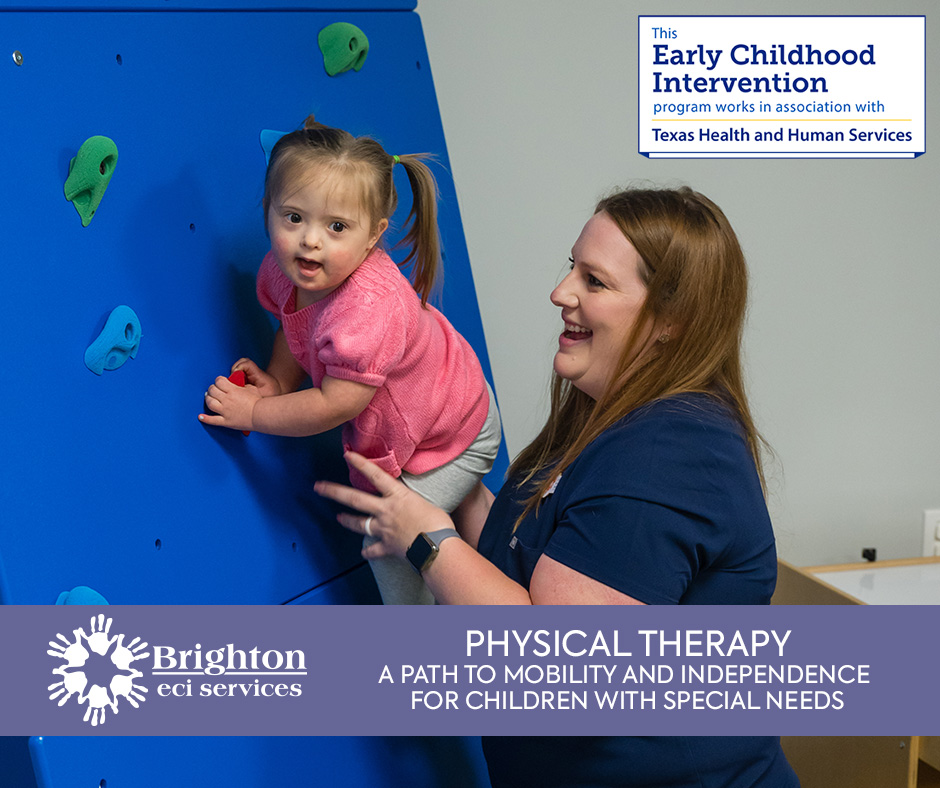October is National Physical Therapy Month. The Brighton Center is blessed to have some of the best and most dedicated physical therapists working with our children and their families. Brighton’s licensed and clinic-based physical therapists (PTs) treat children experiencing delays in gross motor skills by developing their range of motion, flexibility, strength, posture, gait, balance, and coordination. That’s the very business-like way to explain what they do, but the reality is that they do so much more. Please take a few minutes to learn about the physical therapy discipline and why what they do is essential in helping young children flourish!
A Brief History of Physical Therapy
Since its inception, physical therapy has evolved into a crucial healthcare discipline that plays a vital role in improving the quality of life for people of all ages, especially children with chronic conditions, birth defects, and developmental delays.
The roots of physical therapy can be traced back to ancient civilizations. Hippocrates, the father of Western medicine, advocated for massage, manual therapy, and hydrotherapy as early as 460 BC. However, modern physical therapy as we know it today began to take shape in the late 19th and early 20th centuries.
The field gained significant momentum during World War I when “reconstruction aides” were trained to help rehabilitate injured soldiers. These early practitioners, mostly women, used physical education and remedial exercises to help wounded veterans regain function and return to civilian life.
In 1921, Mary McMillan, often referred to as the “Mother of Physical Therapy,” founded the American Women’s Physical Therapeutic Association, which later became the American Physical Therapy Association (APTA). This marked a pivotal moment in the profession’s development, leading to standardized education and practice guidelines.
Throughout the 20th century, physical therapy continued to evolve, incorporating new technologies, research-based techniques, and specializations. Today, it’s a well-established healthcare profession that helps people of all ages maintain, restore, and improve their physical function and mobility.
What is the best part of your job?
“I love being a small part of families’ success stories! By giving caregivers strategies and productive play ideas, we help them be the ones that help their babies reach their milestones.”
– Randa Mullins, PT, DPT
“The best part of my job is watching families grow! Every child brings their own energy to each treatment session. Watching parents and children build their developmental skills and confidence is the true testament to Brighton families’ strength and courage.”
– Abigal Meyer, PT, DPT
“The best part of what I do is witnessing the joy and pride from the children and their families when they accomplish a goal. It warms my heart!”
– Samantha Medley, PT, DPT
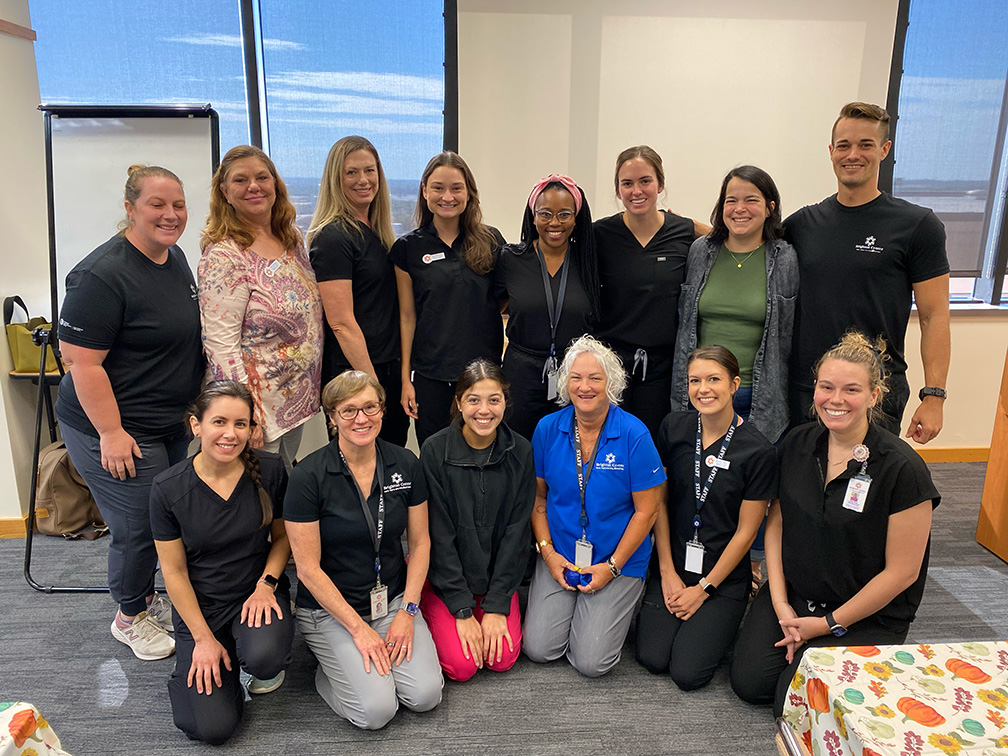
Education and Training for Physical Therapists
Becoming a physical therapist requires extensive education and training to ensure the highest quality of patient care, especially when working with vulnerable populations like children with special needs.
The minimum educational requirement for physical therapists in the United States is a Doctor of Physical Therapy (DPT) degree. This typically involves a bachelor’s degree with prerequisite courses in sciences like biology, chemistry, anatomy, and physiology. Then, a three-year graduate program must be completed. This requires both classroom and clinical experience covering topics like biomechanics, neuroscience, physical therapy techniques and interventions, and more. After completing the DPT program, graduates must pass the National Physical Therapy Examination to obtain a license to practice and then participate in continuing education to maintain their license.
For those specializing in pediatric physical therapy, additional training and certifications are often pursued, such as:
- Pediatric Clinical Specialist (PCS) certification from the American Board of Physical Therapy Specialties
- Courses in specific treatment approaches like neurodevelopmental treatment (NDT) or sensory integration
- Certifications in specialized areas such as pediatric oncology or neonatal therapy
This rigorous education and ongoing professional development ensure that physical therapists are well-equipped to provide high-quality, evidence-based care to children with a wide range of needs and conditions.
Pediatric Physical Therapy
Pediatric physical therapy is a specialized branch of the profession that focuses on improving the lives of infants, children, and adolescents. It aims to enhance motor skills, strength, and overall functional mobility in young patients, particularly those with chronic conditions, birth defects, and developmental delays.
Physical therapists working with children use various techniques and exercises tailored to each child’s specific needs and developmental stage. These may include:
- Therapeutic exercises
- Manual therapy
- Neurodevelopmental treatment
- Sensory integration techniques
- Adaptive equipment training
- Aquatic therapy
- Play-based interventions
The goal is not just to treat existing issues, but also to prevent future complications and promote optimal physical development.
Benefits of Physical Therapy for Children with Chronic Conditions
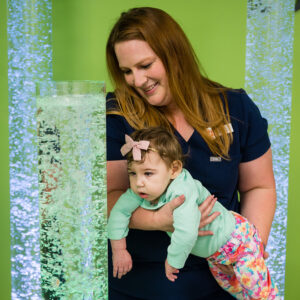 Children with chronic conditions such as cerebral palsy, muscular dystrophy, or juvenile rheumatoid arthritis often face challenges with mobility, strength, and coordination. Physical therapy can provide numerous benefits for these children, including:
Children with chronic conditions such as cerebral palsy, muscular dystrophy, or juvenile rheumatoid arthritis often face challenges with mobility, strength, and coordination. Physical therapy can provide numerous benefits for these children, including:
- Improved muscle strength and flexibility
- Enhanced balance and coordination
- Better posture and gait
- Increased independence in daily activities
- Pain management and reduction
- Prevention of contractures and deformities
For example, a child with cerebral palsy might work with a physical therapist to improve their walking pattern, increase their endurance, and learn to use assistive devices effectively. This can lead to greater independence and participation in school and social activities.
What are your special interests in physical therapy?
“The potential for having the greatest impact on a child is during their first three years. I pursued a specialty certification in pediatrics to help children function and participate in life to the greatest of their ability. I get to see the joy and hope children and their families have with even the smallest gains.”
– Shelly Heilman, PT
“I realized most parents are unsure of how best to physically help their children, especially those diagnosed with cerebral palsy or Spina bifida. I also saw that these children weren’t being treated holistically. So, I dedicated my efforts to working with this population of children. I have found that the best way to teach parents isn’t in an office or over a phone call but in their homes, using my hands to guide their hands to help their children.”
– Jordan Schultz, PT, DPT
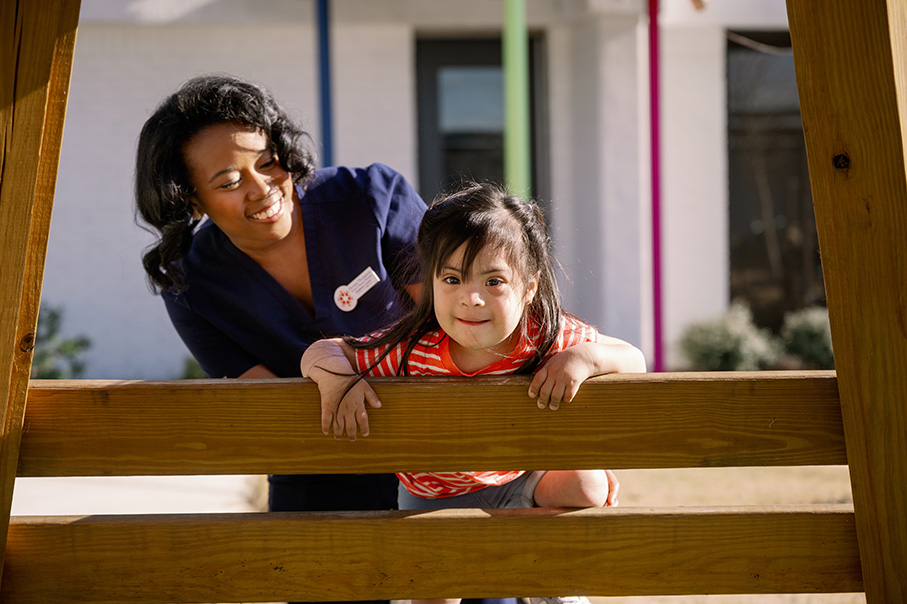
Addressing Birth Defects through Physical Therapy
Birth defects, such as spina bifida, clubfoot, or congenital heart defects, can significantly impact a child’s physical development. Physical therapy plays a crucial role in helping these children reach their full potential by:
- Promoting normal movement patterns
- Addressing muscle imbalances
- Improving cardiovascular endurance
- Teaching compensatory strategies when needed
- Educating families on home exercise programs
In the case of a child with clubfoot, early intervention with physical therapy, often in conjunction with other treatments, can help correct the foot’s position and improve long-term outcomes. For children with spina bifida, physical therapy can help maximize mobility and independence, whether through walking or efficient wheelchair use.
Supporting Children with Developmental Delays
Developmental delays can affect a child’s ability to meet expected milestones in areas such as gross motor skills, fine motor skills, and coordination. Physical therapy can be instrumental in helping these children catch up to their peers by:
- Providing targeted interventions to address specific skill deficits
- Offering opportunities for practice and repetition
- Using play-based activities to engage and motivate the child
- Adapting the environment to promote learning and success
- Collaborating with families and other healthcare providers
For instance, a child with delayed gross motor skills might work with a physical therapist on activities like crawling, standing, and walking. The therapist would break these skills into manageable steps, providing support and guidance as the child progresses.
The Holistic Impact of Physical Therapy
While physical therapy primarily focuses on physical function and mobility, its benefits extend far beyond the physical realm. Children who participate in physical therapy often experience:
- Increased self-esteem and confidence
- Better social skills and peer interactions
- Improved cognitive development
- Enhanced overall quality of life
Moreover, physical therapy can have a positive impact on the entire family. Therapists often work closely with parents and caregivers, providing education, support, and strategies for continuing therapy at home. This empowers families to take an active role in their child’s progress and can reduce stress and anxiety associated with caring for a child with special needs.
Why did you choose to work at Brighton?
“Being a PT at Brighton is a dream job! I love the caring and compassionate culture. Everyone works together in the best interests of the child and family.”
– Shelly Heilman, PT
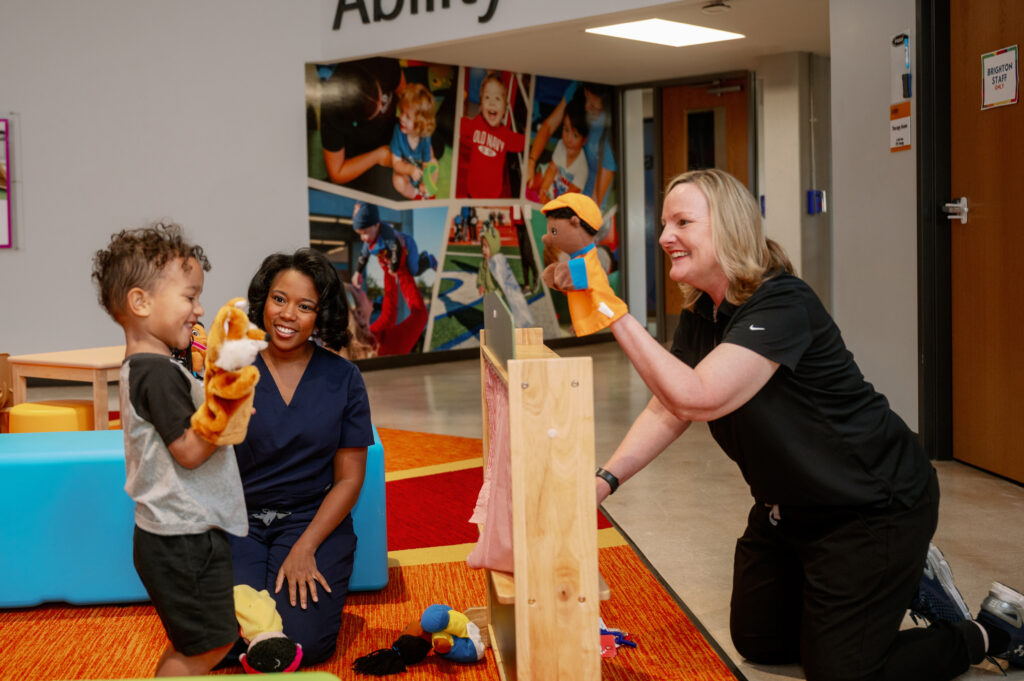
Brighton’s Pediatric Therapy Approach
Brighton provides physical therapy services to children 0-5. Children 0-3 years old are assigned an Early Intervention Specialist (EIS) through our Early Childhood intervention (ECI) service. The EIS coordinates all therapy services, works with the child’s doctors, and connects the family with additional community-based resources as needed.
Children who may need physical therapy undergo an evaluation to determine areas of need. We visit with families to understand what their concerns are and then conduct an examination and assessment of:
- Body structure/function (e.g., muscle and joint function, sensory and neuromotor performance, posture)
- Ability to perform specific activities
- Participation in relevant and meaningful activities
- Need for assistive devices
Our PTs will then establish a care plan. Our physical therapy services may occur at the child’s home, at their daycare location, or out in the community. The goal is to work with children and their families in their own setting. Because children learn best through play, our PTs embed their interventions within play activities to motivate and optimize their ability to participate. Learn more about our physical therapy services here or request an evaluation by filling out a form here.
Early intervention with physical therapy offers a pathway to improved mobility, independence, and overall well-being for children with chronic conditions, birth defects, and developmental delays. At Brighton, our physical therapists apply their skills, expertise, and whole hearts to helping children and their families.
 Click here to learn more about our pediatric therapy programs. If your child is struggling with motor skills, sensory processing, visual-perceptual skills, and other abilities that allow them to investigate and navigate their environment, contact us to schedule an evaluation.
Click here to learn more about our pediatric therapy programs. If your child is struggling with motor skills, sensory processing, visual-perceptual skills, and other abilities that allow them to investigate and navigate their environment, contact us to schedule an evaluation.

